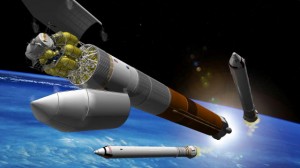Are We Closer to a Commercial Space Plane?
January 31, 2010 by Clarknator
Filed under Featured
 Pittsburgh Pa- Jan 31, 2010- Recent news of US President Obama’s proposed NASA Budget has workers of the fledgling Constellation program, the Shuttle’s replacement, crying foul while the avant-garde private space sector are trying to temper their excitement. With only 5 more Shuttle flights scheduled before NASA retires the fleet in 2010, the Shuttle’s successor is years and billions of dollars away from an inaugural launch. To be clear, the last of 134 Shuttle flights comes to an end on September 16th. Today Russia provides Astronauts a space taxi for direct service to the Space Station for a fee.
Pittsburgh Pa- Jan 31, 2010- Recent news of US President Obama’s proposed NASA Budget has workers of the fledgling Constellation program, the Shuttle’s replacement, crying foul while the avant-garde private space sector are trying to temper their excitement. With only 5 more Shuttle flights scheduled before NASA retires the fleet in 2010, the Shuttle’s successor is years and billions of dollars away from an inaugural launch. To be clear, the last of 134 Shuttle flights comes to an end on September 16th. Today Russia provides Astronauts a space taxi for direct service to the Space Station for a fee.
The president’s proposed budget will be hotly contested in the next coming weeks. What started as President Bush’s plan to establish a base on the moon by 2020 will come to an end because of money. True, President Obama is seeking to increase NASA’s budget by $6B over the next 5 years but the reality of supporting the Space Station until 2020 and installing a lunar base by 2020 can not be achieved. One had to give way to the other.
Relief by the private industry? An independent commission last summer concluded that a lunar base was not possible until 2028 or 2030 given the retraction of promised NASA funding over the Bush years and delays in testing the Ares-1 rocket. The panel cited advances in space technology by the private sector and believed industry could produce a commercial space ship thus reducing the nation’s space transportation costs. President Obama appears to be following the panel’s advice.
The private space sector has been positioning themselves for contracts to move astronauts and cargo to the Space Station and back. The worry by some is that achieving human safety ratings will take time, not that private industry can’t meet the challenge. They also contend that much experience will be lost by abandoning the multi-billion dollar Constellation program. At least 10,000 jobs will be cut at Kennedy Space Center as a result along with an equally sizable number in Houston. In an article by the Associated Press, one private sector advocate dismissed the safety concern by saying we fly Air Tran and Southwest airlines today, not one US government airline. After all, the Shuttle was built by Rockwell in the 70’s and Northrop Grumman built the Lunar Landers in the 60’s. Futhermore there are promising upcoming companies competing for space business too. Space Exploration Technology Corp has a rocket in the test phase called Falcon and a capsule called Dragon. Another is Biglow Aerospace which is building the first commercial space station and a potential space craft provider.
NASA has been trying to privatize some of its operations for two decades. Many of us remember that NASA herald the Space Shuttle as the transportation comercialization of space. Last year NASA said it would give $50M in stimulus for seeding ideas for a commercial spaceship. The winners should be announced soon. Another push comes from the X Prize foundation. They offer up to $30M for a private company to perform robotic and communication tasks from the moon.
So what does the US proposed NASA budget mean for our efforts to place a cross on the moon? The indicators favor competing private industries to literally perform the heavy lifting. NASA will continue to do big things but the routine tasks of space transportation and collecting information on the moon seems headed to be a contracted service. NASA has been driving to this conclusion over the last 20 years. We at Cross on the Moon have contended that today’s 6th and 7th graders would be the ones to work for long periods on the moon. The decision to maintain the Space Station until 2020 has pushed a lunar base for at least 10 years into the future. Perhaps the children being born today will be the ones to work from the moon.
Mankind will certainly reach out beyond the earth as evidenced by the building of the International Space Station. Earth’s people will extend our presence to Mars and beyond with machines first. Practicing one’s faith will not be confined to the gravity of earth. To do so would be to admit that God matters only on our fragile planet.
Source:
Hopes for NASA’s moon mission fade
Washington Post Jan 31
NASA May Soon Turn To Private Companies
CBS Jan 31
NASA To Get More Money, But Must Scratch Moon Plan
Associated Press Jan 28
